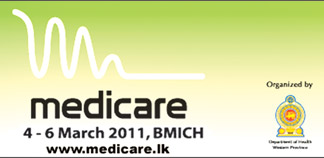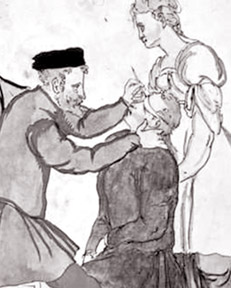
Be patient with your doctor
Dr. Eugene Corea, President, College of General Practitioners
Resource Personnel - Medicare 2011, National Healthcare Exhibition.
 Just how well do you know about your doctor? Are you really getting
the service you deserve or aren’t you happy with what your doctor tells
you? Just how well do you know about your doctor? Are you really getting
the service you deserve or aren’t you happy with what your doctor tells
you?
Dr. Eugene Corea, the Vice President of the College of General
Practitioners, said that, a survey carried out more than a decade ago
indicated that nearly 40,000 deaths occurred annually in USA as a result
of medical errors. Conscious of the harm that errors in the medical
system could cause, the College had set up a Committee on Patient Safety
to work with patients and society in an effort to enhance patient
safety.
A few steps in understanding your doctor will shed more light in
making your trip to the doctor not only a better, but even save your
life and make you return back to health. “We made a few recommendations
about which characteristics good Family Doctors should have and we aim
to have many posters in qualified GPs’ practices for the benefit of
patients” said Dr. Corea.
“The first thing is that you should know is whether your doctor is
registered with the Sri Lanka Medical Council and whether the doctor has
the proper qualifications to practise” said the doctor. He added, “If
they are not registered with the SLMC you should be careful and look for
one who is.”
The next thing is to do would be to ensure that the doctor has a good
attitude when it comes to the appointment. “Frequently when a doctor is
angry or rude, many patients tolerate this without being aware perhaps
of the harm that poor communications can cause to patients and even
doctors,” said Dr. Corea. He further commented, “Always talk with
doctors, see if they are not stressed or fussed because at the very
least they should give you your monies’ worth.”
“Your doctor should listen to you attentively and have a positive
attitude when talking. If they are overworked or temperamental, it maybe
safer to consult another doctor or go to the same doctor later,” he
said. Your doctor should always clear any doubts and answer your
questions properly to the best of their knowledge. “Take all your
records to your doctor to give a background history so that the doctors
know how to help you and go with someone else to give additional
support” said the doctor. Women should tell their doctor if they are
lactating or pregnant.
“Your doctor should explain the steps of management and the follow-up
action needed for your health together with the possible consequences”
said Dr.Corea. “When taking medicines, it is helpful for patients to be
aware of what has been good and bad for them in the past,” said Dr.
Corea. Side effects and reactions to certain medicines vary from person
to person so it is important to be mindful of this and inform your
doctor. Your doctor should clearly explain the effects and side effects
of the drugs prescribed and write the relevant instructions legibly.
“Sometimes, patients convince pharmacists to sell them drugs without
a doctor’s prescription or get medicine from old prescriptions or even
someone else’s prescription. This isn’t proper because the consequences
could be drastic” said Dr. Corea. If you develop side effects for
certain medicines prescribed by the doctor, stop the medicine and tell
your doctor.
“Doctors must give you a good service at an affordable cost,” said
the doctor.
When a doctor is unable to solve a patient’s problem, he/she should
give a proper referral letter to another doctor, medical institution or
hospital. “Any doctor should inform the patient immediately if and when
an error occurred during treatment because it is the patient’s right to
know” said Dr. Corea. He observed that the patients’ safety committee
recommendations even queried saying, “Is your doctor accessible to you
in an emergency and are there any arrangements to contact him/her if
he/she isn’t on call?” There should be arrangements in place for dealing
with such situations. Dr. Corea finally concluded by observing that
doctors are only human and drew attention to the somewhat mischievous
quote attributed to the famous French philosopher Voltaire “Doctors are
men who prescribe medicines of which they know little, to cure diseases
of which they know less, in human beings of whom they know nothing.”
Should we not take Voltaire a bit more seriously with only a pinch of
salt?
Cataract and treatment
Dr. Dharma Irugalbandara Immediate Past President - College of
Ophthalmologist Resources Personnel: Medicare 2011, National Healthcare
Exhibition.
 Normally, a person’s eye lens is a clear transparent structure which
is crystal clear like a glass of water. However, in cataract, the lens
becomes opaque or unclear like a glass of muddy water. “When the lens in
a person’s eye becomes opaque, this gives rise to the condition known as
cataract” said Dr. Irugalbandara. Normally, a person’s eye lens is a clear transparent structure which
is crystal clear like a glass of water. However, in cataract, the lens
becomes opaque or unclear like a glass of muddy water. “When the lens in
a person’s eye becomes opaque, this gives rise to the condition known as
cataract” said Dr. Irugalbandara.
In medical science, a cataract is a clouding that develops in the
crystalline lens of the eye obstructing the passage of light. If
cataract develops in old age, the power of the lens may be increased,
causing near-sightedness (myopia), and the gradual yellowing and
opacification of the lens may reduce the perception of blue colours.
Cataracts traditionally develop gradually causing vision loss and can
lead to blindness if untreated.
The condition usually affects both the eyes, but almost always one
eye is affected earlier than the other.
“Cataract happens to people in old age and it is also secondary to
diabetes which can be worse if the disease isn’t controlled,” said the
doctor. Side effects of cancer treatment drugs and long term dependence
of drugs like steroids, drugs used by psychiatric patients, following an
injury can cause cataract said Dr. Irugalbandara. As a cataract becomes
more opaque, clear vision becomes difficult in person with cataract.
Contrast sensitivity is also lost, so that contours, shadows and colour
vision are less vivid. The veiling glare can be a problem as light is
scattered by the cataract into the eye. Every doctor should perform a
vision test and if a loss in visual acuity is demonstrated, an eye
specialist consultation is recommended. “High-risk groups such as
diabetics must get their eyes checked by an ophthalmologist if they see
a ‘halo’ around street lights at night, especially if this phenomenon
appears to be confined to one eye only” said Dr. Irugalbandara.
Cataracts develop due to many reasons, ageing being the commonest.
Other causes include long-term exposure to ultraviolet light, exposure
to radiation, secondary effects of diseases such as diabetes, and
advanced age, some drugs like prednisolone and drugs given for cancer
treatment and for psychiatric illnesses or injuries to eye. Genetic
factors are often a cause of congenital cataracts and positive family
history may also provoke cataracts at an earlier age if not detected
properly. There are various types of cataracts, e.g. nuclear, cortical,
mature, and hypermature. Cataracts are also classified by their
location, e.g. posterior (classically due to steroid use) and anterior
or total.
If the Vision is poor, the treatment is cataract surgery and
insertion of intraocular implant. In Sri Lanka, the low income category
can request for a free lens through various donors.”
The Social Services Department, Sri Lanka Eye Foundation, some banks
and international NGOs are few regular donors”, said Dr. Irugalbandara.
She added, “As doctors, we advise the patient on what kind of lens they
need. Plus, we can advise on the brands because there are many in the
market.” Further, Dr.Irugalbandara said that the main reason why
cataract in children is very rare in Sri Lanka because of the extensive
and free rubella immunization program.
“I also highly recommend the Rubella vaccination and as we have a
high literacy rate, Sri Lankans are educated enough to immunize their
children against rubella which can cause not only cataract but other
fatal diseases like mental retardation, heart defects, hearing and eye
deficiencies”, she said.
The cataract operation is a simple procedure, the preferred option
called Phacoemulsification (Phaco). Cataract operations are usually
performed using a local anaesthetic nowadays and the patient can be
discharged the same day.
Advances in medical science in intraocular technology now allow
cataract patients to choose a multi-focal lens to help improve their
vision without having to wear reading glasses.
Years ago, the cataract incision was ten times as large as it is
today which takes time to heal where the eye was kept shut for over
three days. “Today, the operation is quicker and the wound heals quicker
as the incision is small” said Dr.Irugalbandara. Through the incision,
ultra sound waves are directed and these break up the offending cataract
and the pieces are sucked out. The folded silicon lens is inserted and
it is folded into two and inserted through the incision.” This
artificial lens quickens the healing process unlike earlier where there
were many stitches, taking time to heal.
“After the cataract operation, patients shouldn’t let bacteria and
germs get into the eye from the first 24 hours to a few days. Once a
germ gets in, it’s difficult for the doctor to treat it so the patient
should be careful and keep the area around the eye clean and hygienic”
said Dr. Irugalbandara. |

